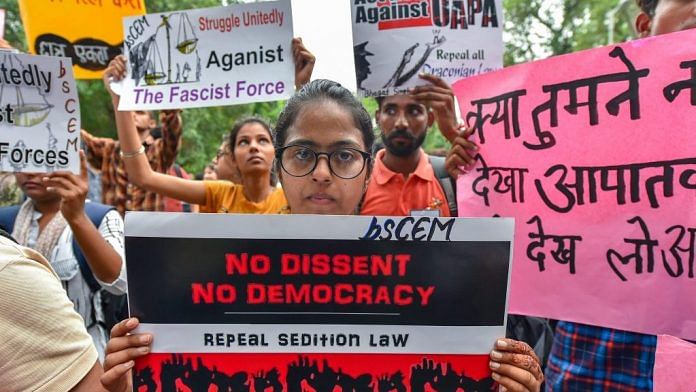New Delhi: While hearing a plea challenging the constitutional validity of the sedition law, Chief Justice of India N.V. Ramana Thursday asked Attorney General K.K. Venugopal whether the law is still needed after 75 years of Independence.
“Dispute is that it is a colonial law and was used by British to suppress freedoms and used against Mahatma Gandhi and Bal Gangadhar Tilak. Is this law still needed after 75 years of independence?” CJI Ramana asked.
He pointed to the “misuse” of the provision and said, “If you see the history of charging under this section, the conviction rate is very low…the enormous power of this section can be compared to a carpenter being given a saw to make an item, (but) uses it to cut the entire forest instead of a tree… That’s the effect of this provision.”
The CJI also clarified that he was not blaming any government but added that the concern was about the “misuse of the law and no accountability of the executive”.
The bench comprising Justices Ramana, A.S. Bopanna and Hrishikesh Roy was hearing a petition filed by an Army veteran, Major-General S.G. Vombatkere (retd.) on 24 June, which asserted that Section 124A is “vague” and creates a “chilling effect on free speech”.
The bench further contended that “a statute criminalizing expression based on unconstitutionally vague definitions of ‘disaffection towards Government’ etc. is an unreasonable restriction on the fundamental right to free expression guaranteed under Article 19(1)(a) and causes constitutionally impermissible ‘Chilling Effect’ on speech.”
On Wednesday, the apex court had directed Vombatkere to serve a copy of the plea to the AG.
Also read: ‘Criticism of govt not sedition’: What Kedar Nath ruling that SC quoted in Vinod Dua case says
CJI on Section 66A of IT Act
During the hearing, Justice Ramana also referred to the fact that Section 66A of the Information Technology Act is still being invoked against people, even after it was struck down by the Supreme Court in 2015.
Section 66A was inserted into the IT Act through an amendment in 2008 to criminalise sending “offensive messages” online.
The apex court had expressed displeasure over the continued use of Section 66A last week as well, after which the central government wrote to states asking them not to register cases under the repealed provision and withdraw any such case that may have been filed.
The CJI also asked the government why it had not done anything about the sedition law, as it had expunged several “stale laws” from the statute books.
“The government has taken out a lot of stale laws, I don’t know why they have not looked into this,” Justice Ramana told the AG.
AG Venugopal then suggested that instead of repealing the section, parameters and guidelines could be laid down.
However, the CJI once again emphasised the “gravity of the situation” and said that “if a party does not want to hear the voice of the other party, they may use this type of law and implicate other people”.
The court then issued notice to the central government and the next date of the hearing will be notified later.
On 30 April, the Supreme Court had also sought the Centre’s response on another petition challenging the sedition law. The plea has been filed by two journalists — Kishorechandra Wangkhemcha and Kanhaiya Lal Shukla, from Manipur and Chhattisgarh, respectively.
(Edited by Rachel John)
Also read: Loopholes in probe, FIRs wrongly clubbed — why court fined Delhi Police in Feb 2020 riots case
